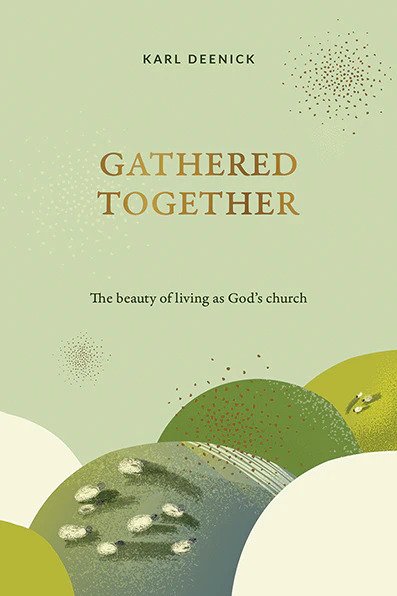Gathered Together, a new book by SMBC lecturer and long-time pastor Karl Deenick is dedicated to the idea that church is where Christians should want to be. Yet with some surveys showing a good chunk of church members are not there on Sundays – some 30 per cent – which may be an underestimate, Gathered Together is a book for the moment. And that 30 per cent are those who claim to be part of a local church, not those who believe but never turn up
So it might even be that more Christians are NOT at church on any Sunday than present in our buildings.
This is attractive to me on one level because it means more people go to heaven than sit on pews/chairs each week.
But Gathered Together suggests they are missing out on something worthwhile, church.
Now, some will feel that church is hard because few people like themselves are there – often expressed as young people wanting more young people.
Deenick has an effective response: “Innumerable times I’ve spoken with people who’ve wanted to leave a church or have already left a church because ‘there’s no one here my age’ or ‘there’s no one here my children’s age’ or ‘there’s no-one here with the same interests as me.’ And while those experiences can be genuinely difficult and can push us towards loneliness, we shouldn’t allow those to become the main criteria by which we assess the church community. …
“If a missionary said, ‘I can’t be part of this church community because there’s no one here like me, no one my age, no one who shares my interests, no one here my children’s age – so I’m going to leave the mission field to find a church where I fit in’ we would think they had completely misunderstood their purpose. In the same way, when we say, ‘I don’t belong to this church because people are not like me,’ we are in danger of failing to understand our purpose and mission as members of Christ’s body.
“In fact, one of the great privileges and treasures of the church is that in it we have the opportunity to connect with and love people who are not like us.”
He tackles the understandable reasons some people have for staying home “You might find being part of a local church difficult for many different reasons. For example, you might have deep scars from past hurts you’ve received in churches. But as painful as those past hurts might be, you really need to ask God to help you deal with those because God wants you to be part of a local community of believers. In fact, in God’s wisdom, it will usually be that community of believers who will help you deal with those hurts. As hard as it can be to face the trauma of bad church experiences, it’s so important because it’s not possible to be a Christian on your own. You need to be part of a local church because being a Christian means being built together into a building where God dwells.”
This book gets a bit controversial when it has a go at some reasons, pretty good reasons perhaps, that people have for going to church. The aim of church, Deenick maintains, should be the aim of gathering together to love God with all our heart, soul, mind and strength.
“Too often, we evaluate our church on other grounds, like how well we think the church is doing in loving us or loving our children, or the quality of the kids’ program or the music, or how far we have to drive to get there. Yet if the chief criteria by which we evaluate a church is how well it is loving us, then we’re putting ourselves in the place of God himself. If the chief criterion by which you evaluate your church is how well it fits in with your kids life, then you’re making your children your god. If the chief criterion by which you evaluate your church is the music, then you’re making music your god. If the chief criterion by which you evaluate your church is how long it takes to get there, then you’re making convenience your god.
“Instead, we need to ask: Is our church a place where people love God with all their heart, soul, mind and strength? “
There’s an inconvenient little word “all” in that last par. Sometimes my church involvement is a bit like a low-strength beer. Not as strong as it could be. Please stop me before it gets to zero.
But lest the aspiration to love God with “all” be something so hard that I can safely dismiss it, Deenick introduces, like Jesus did, the second commandment. We love our neighbours.
“We ought to give generously, share what we have, listen to others, weep with others, show deep compassion, and care for the poor and helpless. We ought to show such love not only to those who are nice to us but even to those who hate us.
“That might mean helping a work colleague who is constantly undermining you. It might mean helping your neighbour who is at war with you. It might mean giving a lift to someone with whom you don’t really get on. In doing these things, we fulfil an important part of the mission of the church. “
And not just to evangelise them, Deenick is at pains to point out.
One image from the book that struck me: “The sails of the Sydney Opera House are made up of over one million tiles. If you stand up close to the Opera House, the tiles look quite ordinary. One or two tiles, or even ten or twenty tiles, don’t look particularly spectacular. But if you stand right back and see what they make up together, you’ll find yourself looking at one of the greatest works of architecture the world has ever seen. You don’t look at the Sydney Opera House and think, “Wow, what a great collection of tiles!” You think, “Wow, what a great building!”
Being built as living stones (not quite tiles, but the metaphor holds) into the church, or identity is as a gathered people.
In a time when most of us have good reason to be let down by some prominent leaders, and this applies to all sorts of Christian groups, it is good to be reminded that we are being built into something glorious under our leader, Jesus. If you were to get hold of a tile from the Opera house, its glory consists of being part of that building.
A member of my wider family, no names here, somehow inherited a brick that had been part of the Old Government House. It was an ordinary brick from a wonderful place.
“Although it is deeply countercultural and even possibly offensive to some, the same can be said of the church—not simply the church of God gathered in heaven, but also the local church.”
We are not just a collection of individuals.
If you read Gathered Together, you’ll find many other issues to tease out.
Here are a few:
Did all the Christians in Corinth gather together?
Church is not the place to do most of our serving.
We don’t have to make the church do everything we want to do.
The great commission mostly happens outside of church.
Gathering in church is only 3 per cent of your time.
And a final quote: “Churches remain places where sinners gather together, which means they will always be places of disappointment and heartache. Yet we also need to start expecting, longing, praying and working for the right things.”

Gathered Together by Karl Deenick, Matthias Media 2023, $19.99 is available at the Wandering Bookseller

